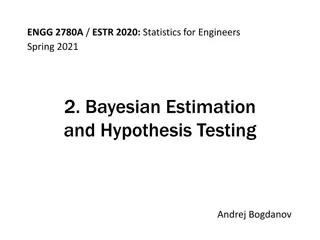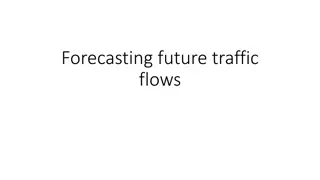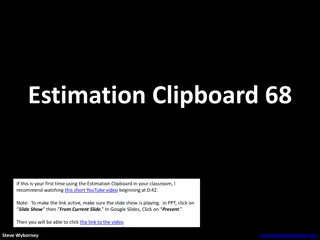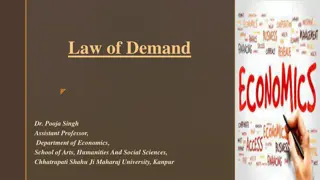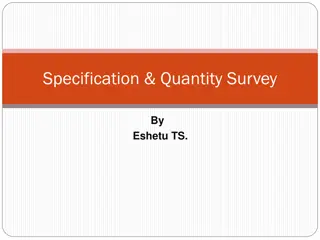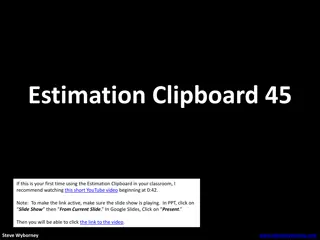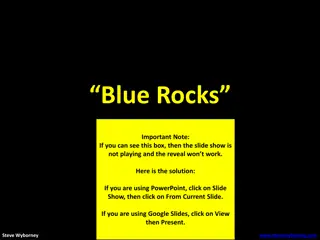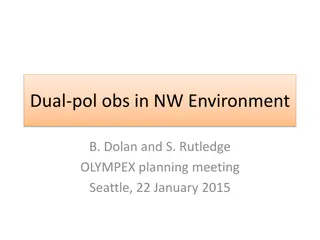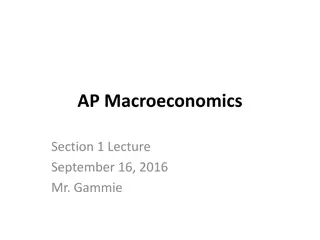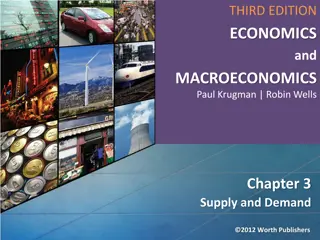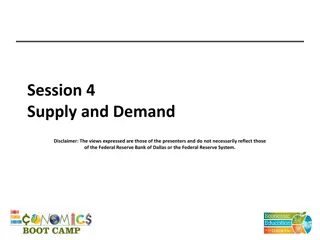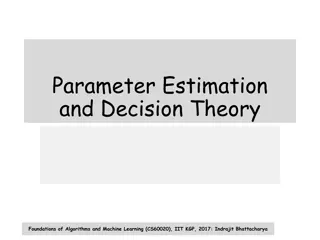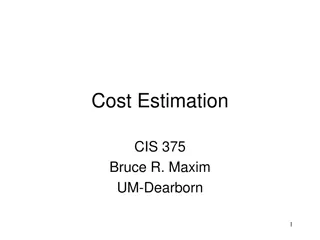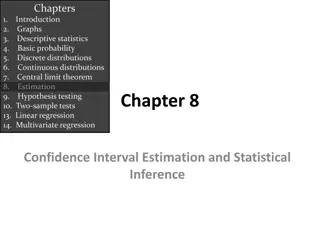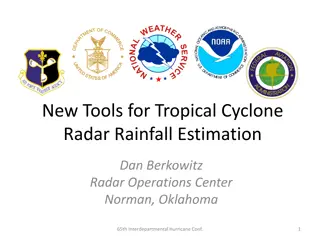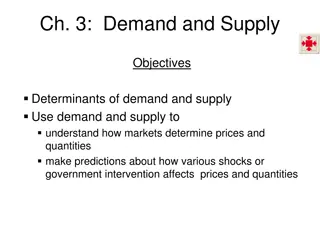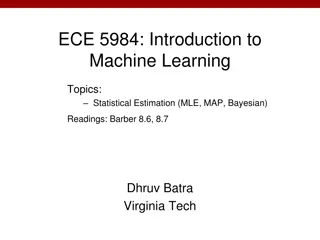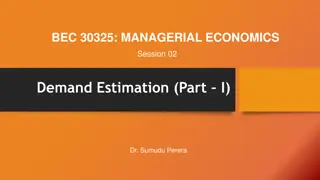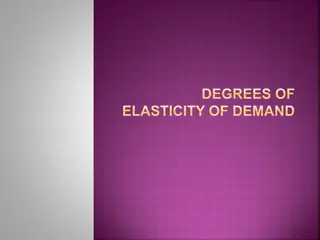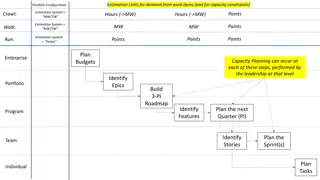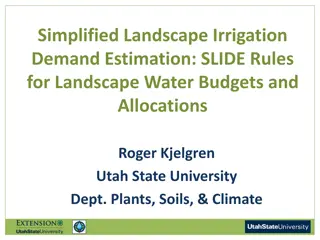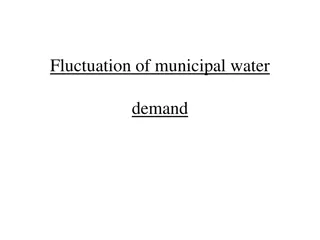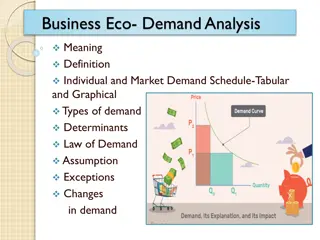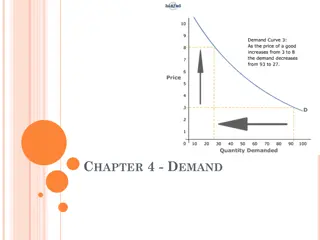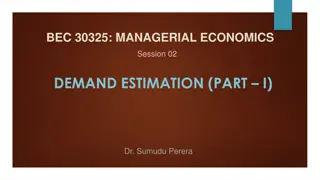Demand Estimation and Demand Forecasting
Demand estimation and forecasting are crucial processes for businesses to predict future demand for their products or services. Demand estimation involves analyzing the impact of various variables on demand levels and pricing strategies, while demand forecasting helps in planning production, new pro
1 views • 7 slides
Bayesian Estimation and Hypothesis Testing in Statistics for Engineers
In this course on Bayesian Estimation and Hypothesis Testing for Engineers, various concepts such as point estimation, conditional expectation, Maximum a posteriori estimator, hypothesis testing, and error analysis are covered. Topics include turning conditional PDF/PMF estimates into one number, es
1 views • 16 slides
Principles of Traffic Demand Analysis and Highway Demand Forecasting
Understanding traffic flows is crucial in designing highways and managing traffic effectively. Traffic demand analysis involves forecasting future traffic volumes, modeling demand, and determining the necessary infrastructure improvements. This analysis helps in estimating axle loadings, pavement th
0 views • 36 slides
Estimation Clipboard 68 and New Esti-Mysteries Resources
Dive into Estimation Clipboard 68 and explore new Esti-Mysteries and Number Sense resources for everyday use in the classroom. Discover engaging activities and tools designed by Steve Wyborney to enhance mathematical learning experiences. Watch the instructional video, solve the bear estimation chal
0 views • 4 slides
Understanding Demand in Economics: Chapter 4 Overview
Demand in economics is dictated by the law of demand, where lower prices lead to increased purchases and vice versa. This chapter delves into the factors influencing demand, such as substitution effects, income effects, demand schedules, and market demand. Learn how shifts in the demand curve impact
0 views • 26 slides
Understanding the Law of Demand in Economics
The Law of Demand, explained by Dr. Pooja Singh, Assistant Professor at Chhatrapati Shahu Ji Maharaj University, Kanpur, outlines the inverse relationship between the price of a commodity and the quantity demanded. This fundamental economic principle states that as the price of a product decreases,
0 views • 9 slides
Project Cost Estimation: Methods and Factors
Project cost estimation involves valuing all monetary aspects necessary for planning, implementing, and monitoring a project. This includes various entrants such as preliminary investigation costs, design fees, construction expenses, and more. The purpose of cost estimation is to determine work volu
1 views • 44 slides
Using the Estimation Clipboard in the Classroom
Explore tips for effectively using the Estimation Clipboard in the classroom to engage students in mathematical reasoning and estimation activities. The process involves inviting students to share estimates, encouraging written estimates and discussions, and revealing answers to promote engagement a
0 views • 5 slides
Techniques for Demand Estimation in Economics and Their Applications
Estimation of probable demand is crucial for economic planning. This method utilizes past demand data to forecast future demand, aiding in decision-making, budgeting, and pricing strategies. It helps in managing business fluctuations, understanding consumer needs, and analyzing market influences. Me
1 views • 12 slides
3D Human Pose Estimation Using HG-RCNN and Weak-Perspective Projection
This project focuses on multi-person 3D human pose estimation from monocular images using advanced techniques like HG-RCNN for 2D heatmaps estimation and a shallow 3D pose module for lifting keypoints to 3D space. The approach leverages weak-perspective projection assumptions for global pose approxi
0 views • 8 slides
Dealing with Range Anxiety in Mean Estimation
Dealing with range anxiety in mean estimation involves exploring methods to improve accuracy when estimating the mean value of a random variable based on sampled data. Various techniques such as quantile truncation, quantile estimation, and reducing dynamic range are discussed. The goal is to reduce
1 views • 12 slides
Estimation Puzzle: How Many Blue Rocks in the Vase?
A fun estimation challenge where clues are provided to narrow down the possibilities of the number of blue rocks in a vase. By using critical thinking and estimation skills, participants deduce that there are 65 blue rocks in the vase. Test your estimation abilities with engaging visual clues and de
0 views • 6 slides
The Hidden Benefit of Cool Roofs in Reducing Peak Energy Demand
Commercial building owners can reduce peak energy demand by installing cool roofs, leading to lower electricity costs and environmental benefits. Peak energy demand can strain the power grid, require additional capacity, and result in higher electricity rates. By understanding base use and peak dema
0 views • 31 slides
Dual-Pol Observations in NW Environment OLYMPEX Planning Meeting
The OLYMPEX planning meeting in Seattle on January 22, 2015 discussed the contribution of polarimetric S-band radar in rain estimation systems targeted by OLYMPEX. The use of specific differential phase (Kdp) helps in minimizing assumptions about drop size distribution, convective/stratiform distinc
1 views • 15 slides
Understanding Demand in Macroeconomics: Key Concepts and Laws
Exploring the fundamental concepts of demand in AP Macroeconomics, including quantity demanded, demand schedules, the law of demand, and key terms. Practice questions help reinforce learning by testing knowledge on factors affecting demand for various goods. Through visual aids and explanations, rea
0 views • 17 slides
Fermi Problems and Estimation Techniques in Science
Understand Enrico Fermi's approach to problem-solving through estimation in science as demonstrated by Fermi Problems. These problems involve making educated guesses to reach approximate answers, fostering creativity, critical thinking, and estimation skills. Explore the application of Fermi Problem
0 views • 23 slides
Understanding Supply and Demand in a Competitive Market
This content delves into the concept of supply and demand in a competitive market as described by the renowned economists Paul Krugman and Robin Wells. It covers the basics of a competitive market, the dynamics of supply and demand curves, movements along curves, market equilibrium, and how prices a
0 views • 42 slides
Understanding Supply and Demand in Economics
Exploring the interaction of supply, demand, and price in economics through topics such as market dynamics, characteristics of competitive markets, the law of demand, determinants of demand, and shifting demand. Gain insights into how changes in price and various factors affect supply and demand equ
0 views • 24 slides
Foundations of Parameter Estimation and Decision Theory in Machine Learning
Explore the foundations of parameter estimation and decision theory in machine learning through topics such as frequentist estimation, properties of estimators, Bayesian parameter estimation, and maximum likelihood estimator. Understand concepts like consistency, bias-variance trade-off, and the Bay
0 views • 15 slides
Software Development Cost Estimation Best Practices
Explore key principles and techniques for accurate cost estimation in software development projects. Discover the importance of the 5WHH principle, management spectrum, critical practices, resource estimation, estimation options, and decomposition techniques for improved project planning. Learn abou
0 views • 40 slides
Understanding Estimation and Statistical Inference in Data Analysis
Statistical inference involves acquiring information and drawing conclusions about populations from samples using estimation and hypothesis testing. Estimation determines population parameter values based on sample statistics, utilizing point and interval estimators. Interval estimates, known as con
0 views • 41 slides
Advances in Tropical Cyclone Radar Rainfall Estimation
Reviewing past methods and introducing new tools for radar rainfall estimation in tropical cyclones. Discusses advancements in Dual Polarization rainfall estimation and NSSL's National Mosaic & Multi-Sensor Quantitative Precipitation Estimation. Includes insights on reflectivity-to-rainfall relation
0 views • 28 slides
Understanding Supply and Demand in Economics
Supply and demand play a crucial role in determining trade in economics. Buyers purchase goods and services, while sellers earn money from selling. The equilibrium price is determined by the willingness of buyers and sellers to trade. Demand encompasses the desire, willingness, and ability to buy a
0 views • 20 slides
Understanding Demand and Supply in Market Economics
Explore the fundamentals of demand and supply in market economics, analyzing how prices and quantities are determined. Learn about the factors influencing demand and supply, and how various external factors impact market dynamics. Discover the principles behind the law of demand, demand curves, shif
0 views • 20 slides
Understanding the Law of Demand in Economics
The Law of Demand explains the inverse relationship between the price of a product and the quantity demanded. As the price increases, demand decreases, and vice versa. Factors affecting demand include the price of substitute and complementary goods, consumer income, preferences, and time. The Demand
0 views • 17 slides
Introduction to Statistical Estimation in Machine Learning
Explore the fundamental concepts of statistical estimation in machine learning, including Maximum Likelihood Estimation (MLE), Maximum A Posteriori (MAP), and Bayesian estimation. Learn about key topics such as probabilities, interpreting probabilities from different perspectives, marginal distribut
0 views • 23 slides
Managerial Economics: Understanding Demand Estimation
Explore the fundamental concepts of demand estimation in managerial economics, covering topics such as the definition of demand, the law of demand, price elasticity, income elasticity, cross elasticity, and more. Dr. Sumudu Perera provides insights on how quantity demanded relates to factors like pr
0 views • 23 slides
Understanding Degrees of Elasticity of Demand
Elasticity of demand refers to the responsiveness of quantity demanded to changes in price. Perfectly elastic demand occurs when there is an infinite demand at a particular price and demand becomes zero with a slight rise in price. Conversely, perfectly inelastic demand occurs when there is no chang
0 views • 11 slides
Understanding Supply and Demand in Competitive Markets
Supply and Demand are crucial forces in market economies that determine prices and quantities of goods. This content explores the concept of competitive markets, the relationship between demand and price, and the impact of related goods on demand. It delves into market dynamics through examples such
0 views • 50 slides
Capacity Planning and Estimation Units in Jira Alignment
This detailed guide outlines the process of capacity planning and estimation units in Jira alignment, covering steps from entering demand to capturing estimates and planning sprints. It explains where and how to enter capacity and demand, who captures estimates, and the purpose of different estimati
0 views • 4 slides
Understanding Two-Stage Local Linear Least Squares Estimation
This presentation by Prof. Dr. Jos LT Blank delves into the application of two-stage local linear least squares estimation in Dutch secondary education. It discusses the pros and cons of stochastic frontier analysis (SFA) and data envelopment analysis (DEA), recent developments in local estimation t
0 views • 24 slides
Simplified Landscape Irrigation Demand Estimation: SLIDE Rules for Water Budgets
Simplified Landscape Irrigation Demand Estimation presents a comprehensive guide on managing urban landscape water use efficiently. Collaborators from various institutions contribute to addressing the challenges posed by drought and climate change. The document explores plant water demand, atmospher
0 views • 29 slides
Advanced Gaze Estimation Techniques: A Comprehensive Overview
Explore advanced gaze estimation techniques such as Cross-Ratio based trackers, Geometric Models of the Eye, Model-based Gaze Estimation, and more. Learn about their pros and cons, from accurate 3D gaze direction to head pose invariance. Discover the significance of Glint, Pupil, Iris, Sclera, and C
0 views • 40 slides
Understanding Demand and Consumer Behavior in Economics
Demand in economics refers to the quantity of a commodity consumers are willing to buy at a given price within a specific time period. Various factors influence demand, such as price, consumer income, related goods prices, consumer preferences, advertising, and population size. Types of demand inclu
0 views • 20 slides
Understanding the Market Force of Demand
Demand is essential in economics, representing the quantity buyers are willing to purchase at different prices. The Law of Demand asserts that as prices rise, demand falls. Through demand schedules and curves, we analyze how factors like price, number of buyers, income, and related goods influence d
2 views • 13 slides
Understanding Municipal Water Demand Fluctuations
There is a wide variation in seasonal, daily, and hourly water demands for municipal water supply. Factors like working days, weather conditions, and time of day influence the demand patterns. Analysis of average demand, maximum day demand, and peak hourly demand is crucial for capacity planning of
0 views • 6 slides
Understanding Demand Analysis in Economics
Demand analysis in economics involves studying individual and market demand, demand schedules, determinants, the law of demand, exceptions, and factors influencing changes in demand. Dr. Sachin M. Prayag explains the concept of demand, including desire, willingness to pay, and ability to pay, with g
0 views • 15 slides
Understanding Demand in Chapter 4
In Chapter 4, the concept of demand is explored, encompassing the desire, ability, and willingness to purchase a product. It delves into the demand schedule, demand curve, law of demand, and factors influencing demand such as consumer income. The chapter also covers marginal utility and the diminish
0 views • 18 slides
Understanding the Black-Scholes Formula and Volatility Estimation
The Black-Scholes formula, developed by Dr. Fernando Diz, is a widely used model for pricing options. This formula calculates the theoretical price of an option based on various inputs, with volatility being a key factor. Volatility estimation can be done through historical or implied methods, each
0 views • 18 slides
Managerial Economics - Understanding Demand Estimation Fundamentals
Delve into the world of managerial economics with a focus on demand estimation. Explore concepts such as the law of demand, price elasticity, market demand vs. individual demand, and the demand curve. Learn how to analyze consumer behavior and predict market trends through quantitative analysis tech
0 views • 20 slides

